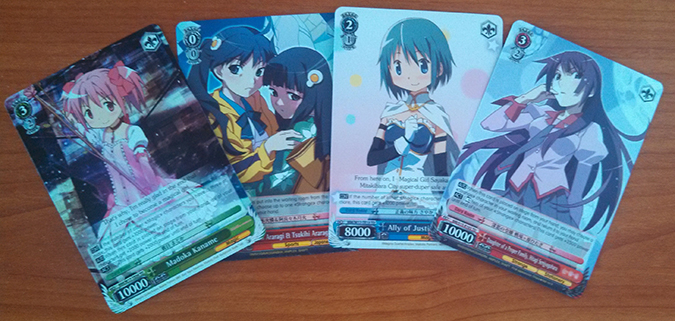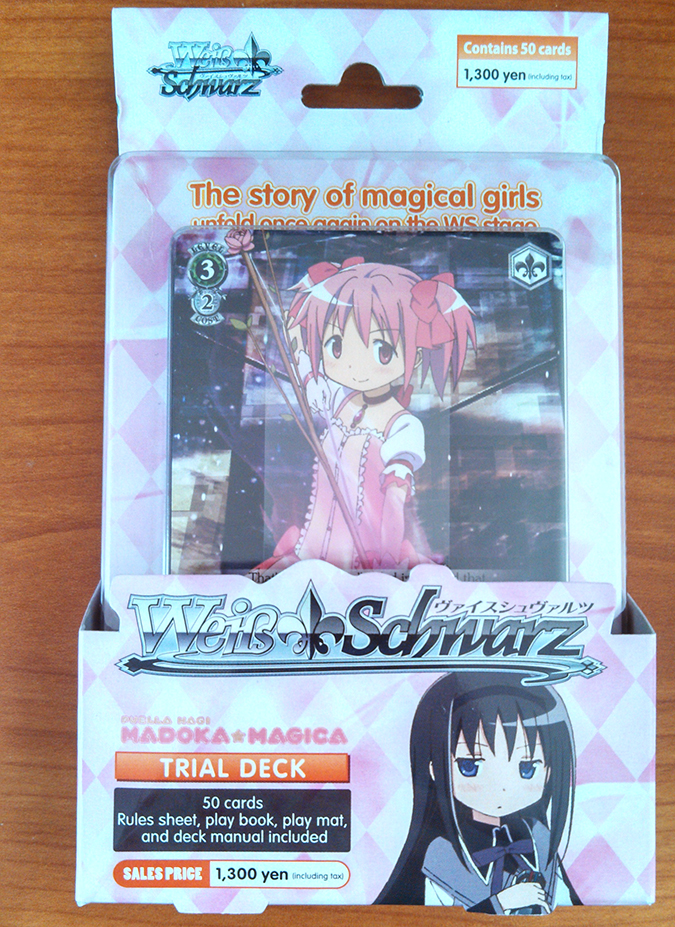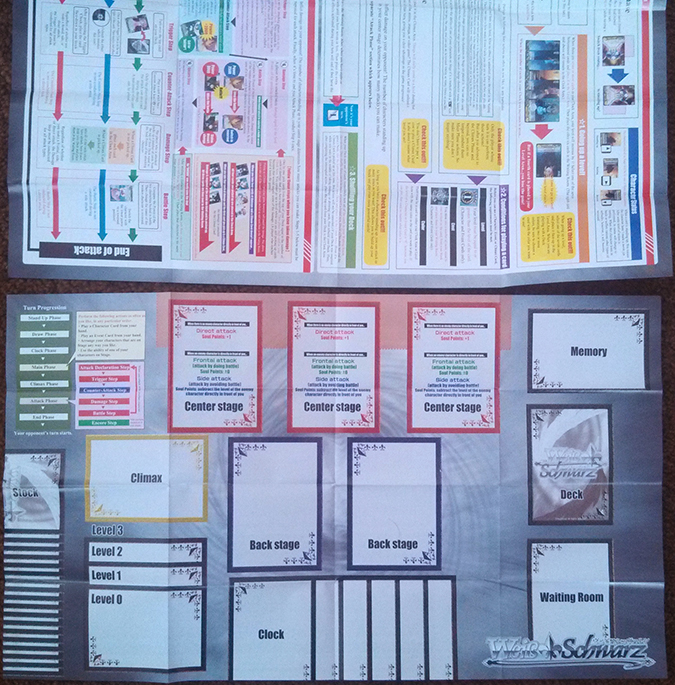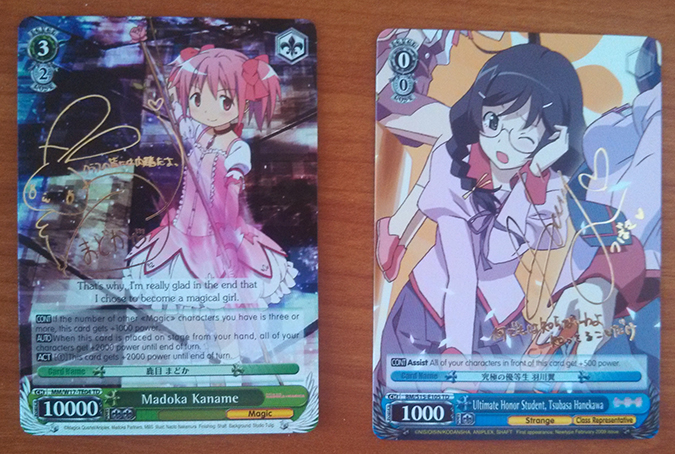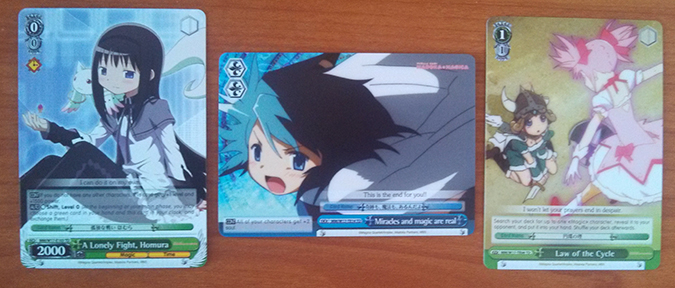If there’s one thing anime fans love, it’s tracking down merchandise from our favorite shows. Print our favorite characters on anything from a mug to a messenger bag and we’ll buy it. Naturally, then, I was intrigued to learn about a trading card game based around popular anime franchises. I threw some money at the Internet, and soon had a pair of Weiss Schwarz trial decks. Here’s what I learned.
Photos courtesy of my phone’s lousy camera.
Weiss Schwarz is a trading card game that licenses anime, manga, and video game characters instead of offering the usual selection of orcs and dragons. There are English versions of several of their releases, including four anime series and the Vocaloid characters (because you can’t have anime without Hatsune Miku). If you can read Japanese or don’t mind referring to online forums for card translations, there’s a much more extensive selection to choose from. For this article, I bought the English starter decks for Madoka Magica and Bakemonogatari.
The pre-built Trial Decks come in a retail-friendly, impulse buy-inducing display box. My local post office was thoughtful enough to confirm that the packaging is sturdy enough to survive some rough handling during the shipping process. Opening the box is a simple matter of cutting a few pieces of tape with a box cutter or pocket knife. No profanity or bandages were necessary, which is a good sign given my clumsiness and low tolerance for complex packaging.
1300 yen INCLUDING tax? I’m sold!
Along with a 50-card deck, each box contains a basic rule sheet, a play mat, and an advanced rule booklet to settle the inevitable arguments over how a particular card works. I was a bit worried that the rules would be a hodgepodge of bad grammar that some underpaid assistant translated with a smartphone app, but was happy to be proven wrong. Everything was easy to understand, and the play mat is extremely helpful once you get it unfolded and flattened out.
I swear it’s not as complicated as it looks.
The quality of the cards themselves is reasonably high. They’re smooth enough to shuffle easily, and appear sturdy enough to stand up to regular use. They have the same dimensions as a Magic: The Gathering card, so card protector sleeves should be easy to acquire. Weiss Schwarz does away with the fancy holo-foil cards that we’ve gotten used to over the years, but fills that void by printing voice actor autographs onto the occasional character card. Most of a typical card is taken up by the character art, but the actual game information is plenty legible. My one gripe is that the ability text is small enough to require either good eyesight or a magnifying glass. On the whole, though, I’m very happy with what I got for my money.
Ooh, shiny.
Anyone who’s played a trading card game like Magic: The Gathering, Pokémon, or Yu-Gi-Oh! should be able to pick up Weiss Schwarz fairly easily. Decks are mostly composed of character cards, which deal damage to your opponents and fight against their characters. Event cards and climax cards are thrown in help manage your deck or power up your characters. Whoever deals a certain amount of damage first wins the game.
From left to right: character card, climax card, event card.
The most interesting aspect of Weiss Schwarz is its ability to shift the balance of power back and forth during a game. After taking a certain amount of damage, players “level up” and gain access to more powerful character cards. If your opponent beats the stuffing out of you early in the game, you can even the score by bringing out big scary cards that will mop the floor with their low-level characters. It makes for plenty of “this isn’t even my final form” jokes if you can find the right opponent.
After playing a few games of Weiss Schwarz, I’ve noticed a couple of things. First and foremost, the level mechanic does a great job of keeping things close until the end. Matches have a habit of going right down to the wire, with victory rarely certain until the last couple of turns. It might not support as wide a range of strategies as more complex card games, but damned if Weiss Schwarz doesn’t do a great job of keeping things entertaining.
Another positive element is the sheer absurdity of it all. There’s something delightfully crazy about the idea of Hitagi Senjyougahara clobbering magical girls with a stapler or Saber from Fate Zero stabbing Hatsune Miku in the middle of a concert. As long as you can find a deck based on your favorite franchise, Weiss Schwarz appeals to that basic geek instinct of wondering which of two fictional characters would win in a fight. That being said, you really do need to be an anime fan to get the full effect. Playing Weiss Schwarz between panels at an anime convention is a much better idea than breaking it out when your friends from work come over for game night.
For anime fans with a taste for trading card games, Weiss Schwarz is an easy recommendation. The game is entertaining, and the cards themselves are well made. I’m not quite blown away enough to start buying booster packs and building decks from scratch, but I can see myself buying more pre-built decks as new properties get licensed. Weiss Schwarz is an appealing addition to the US anime scene, and I’m sure it will carve out a comfortable niche for itself.
Weiss Schwarz products are available via Amazon
